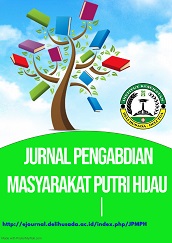SOSIALISASI MENJAGA KEBERSIHAN DIRI (PERSONAL HYGIENE) PADA PANTI ASUHAN ANAK LIORA TERANG
Abstract
For kids, maintaining personal hygiene is crucial because they often get sick due to not paying attention to it. Personal hygiene is the practice of preserving the health and sanitation of children for their physical and mental well-being. Personal hygiene knowledge must be acquired at an early age. The aim is that the child's knowledge about personal hygiene will become more mature, so that the child will get used to practicing personal hygiene. Apart from that, to increase knowledge about maintaining cleanliness in everyday life. In the process of internalizing personal hygiene behavior, there are several behaviors such as washing hands, bathing, shampooing (washing hair), brushing teeth, cutting nails, and cleaning ears. Presentations were utilized to conduct this activity, group discussions with orphanage children, and continued by providing education about the value of good personal hygiene and methods for practicing it in everyday life. This activity took place with a total of 21 participants. The personal hygiene material presented, includes: the benefits of maintaining personal hygiene, how to practice proper personal hygiene, including hand cleansing, tooth flossing, bathing, shampooing, cutting nails, changing clothes and not sharing personal items with other people. Apart from that, environmental hygiene material was also presented including: keeping the house clean, such as cleaning the floor of the house, not piling up dirty clothes and always changing bed linen regularly.
References
M. Ghanim, N. Dash, B. Abdullah, H. Issa, R. Albarazi, and Z. Al Saheli, “Knowledgeand Practice of Personal Hygiene among Primary School Students in Sharjah-UAE,” Artic. J. Heal. Sci., vol. 6, no. 5, pp. 67–73, 2016, doi: 10.5923/j.health.20160605.01.
M. R. Soleymani, S. Hemmati, H. Ashrafi-Rizi, and L. Shahrzadi, “Comparison of the effects of storytelling and creative drama methods on children’s awareness about personal hygiene,” J. Educ. Health Promot., vol. 6, no. 1, p. 82, 2017, doi: 10.4103/JEHP.JEHP_56_16
Mulyani, W. (2022). Penyuluhan Personal Hygiene Untuk Meningkatkan Kesehatan Kulit Anak-Anak Panti Asuhan Hikmah Rumbai Pekanbaru. Jurnal Pengabdian Masyarakat, 1(06), 519–522.
Napitupulu, M., Napitupulu, N. F., & Haslinah. (2021). Peningkatan Pengetahuan Personal Hygiene dengan Metode Penyuluhan Kesehatan pada Anak Asrama Panti Asuhan Ujunggurap Padangsidimpuan. Jurnal Pengabdian Masyarakat Aufa (JPMA), 3(3), 157–162. https://jurnal.unar.ac.id/index.php/jamunar/article/view/563
Nurmala, F. Rahman, A. Nugroho, N. Erliyani, N. Laily, and V. Anhar, Promosi Kesehatan. Surabaya: Airlangga University Press. Hal 2-3, 2018, doi: https://repository.unair.ac.id/87974/2/Buku%20Promosi%20Kesehatan.pdf
R. Nurhayati andS. Wuri, “Personal Hygiene Practices in 5th Grade Elementary School Students,” J. Heal. Educ., vol. 5, no. 2, pp. 94–100, Sep. 2020, doi: 10.15294/JHE.V5I2.30384.
Susanty, E., & Yusdiana, Y. (2022). Peningkatan Pengetahuan dan Perilaku Personal Hygiene Anak di Panti Asuhan Baiturrahmah Kampar. Abdi: Jurnal Pengabdian Dan Pemberdayaan Masyarakat, 4(1), 211–216. https://doi.org/10.24036/abdi.v4i1.223
X. Chen, L. Ran, Q. Liu, Q. Hu, X. Du, and X. Tan, “Hand Hygiene, Mask-Wearing Behaviors and Its Associated Factors during the COVID-19 Epidemic: A Cross-Sectional Study among Primary School Students in Wuhan, China,” Int. J. Environ. Res. Public Heal. 2020, Vol. 17, Page 2893, vol. 17, no. 8, p. 2893, Apr. 2020, doi: 10.3390/IJERPH17082893












